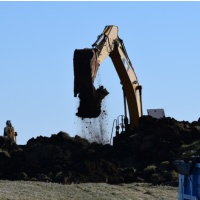South Dakota Oil Spill Called “Small” by TransCanada Comes to 17,000 Gallons
 TransCanada digs up the failed pipeline--Credit: Cindy Myers
TransCanada digs up the failed pipeline--Credit: Cindy Myers
By Lacey Louwagie, Courthouse News Service
FREEMAN, S.D. – The spill that TransCanada officials initially called “small in scope” released almost 17,000 gallons of oil into South Dakota farmland near the small town of Freeman, according to the company’s most recent estimates.
TransCanada crews have been at the site of the spill around the clock since it was discovered last weekend by local landowner Loren Shultz. So far, they have excavated 100 miles of pipeline in search of the spill’s source, according to the Associated Press.
TransCananda has not released additional information since Thursday, even though spokesman Mark Cooper told Courthouse News at about noon on Friday that an update would be forthcoming in “an hour or so.”
But no additional information was released by the end of the business day, and Courthouse News received no response to a follow-up email.
Cindy Myers, a retired registered nurse and a lay intervenor who testified against renewing TransCanada’s pipeline permit in South Dakota before the Public Utilities Commission, told Courthouse News she was “not surprised” that the spill was larger than initially believed.
“If the leak is coming from the pipes underground, it’s going to take a lot of oil before it surfaces,” she said.
“This makes me wonder about the integrity of the pipeline all up and down the route,” she added. “Now we have a leak, like I’ve always feared, and here it’s been six days and they still can’t find where the leak is coming from.”
Myers said that as a mostly retired nurse who has worked with cancer patients, she is primarily concerned with public health and with the presence of benzene in oil.
“It’s a class 1 carcinogenic,” she said. “It causes leukemia over time and affects bone marrow. A benzene cloud can kill those exposed to it in five to 10 minutes, according to the Agency for Toxic Substances and Disease Registry. People can be affected by eating foods that have been contaminated [with benzene]. If water is contaminated, it can soak through the skin, so you can’t wash dishes, wash clothes, or bathe in it.”
She added that only 17 drops of benzene could contaminate a 50,000-gallon water tower, and that standard water treatment facilities aren’t able to remove it.
Myers also pointed Courthouse News toward Dr. Arden Davis’ testimony from when South Dakota’s Public Utilities Commission first considered TransCanada’s application for a permit in 2007. Davis holds an advanced degree in geological engineering.
“[Benzene’s] maximum contaminant level in drinking water is 5 parts per billion,” Davis said in his testimony. “Benzene is soluble in groundwater and can be transported down-gradient toward receptors such as private wells and public water-supply wells.”
Because of this, Davis hypothesized that “a crude oil pipeline leak could contaminate a large body of groundwater in shallow glacial aquifers of southeastern South Dakota.”
In addition, the spill occurred just 11 miles from the James River, which feeds into the Missouri River downstream.
Myers, who visited the spill site, also expressed concern for the nearby farm’s groundwater supply, as the farmhouse was only about 300 feet from where the aboveground oil was discovered.
“[Oil] can ooze for a long time undetected,” Myers said. “So that could have been oozing for three months. Has that gotten into the well water? Have those people drank contaminated water and not known it?”
One of TransCanada’s permit requirements was that it replace plastic and PVC piping of all groundwater supplies within 500 feet of the oil line, since benzene can permeate plastic and PVC, Myers said, adding that she hopes TransCanada had replaced the water lines at the nearby farm and checked their water supply.
Schultz, who discovered the spill in a field on his land on April 2, told Forum News he had “no complaints” with the way TransCanada was handling the situation.
To Learn More:
Obama May Have Vetoed Keystone Pipeline, but Part of it is Already Built (by Noel Brinkerhoff and Steve Straehley, AllGov)
Canadian Energy Company Bullies Nebraska Residents over Pipeline Right-of-Way (by Noel Brinkerhoff, AllGov)
State Dept. Releases Keystone Pipeline Report Amid Conflict-of-Interest Controversy (by Steve Straehley, AllGov)
- Top Stories
- Unusual News
- Where is the Money Going?
- Controversies
- U.S. and the World
- Appointments and Resignations
- Latest News
- Musk and Trump Fire Members of Congress
- Trump Calls for Violent Street Demonstrations Against Himself
- Trump Changes Name of Republican Party
- The 2024 Election By the Numbers
- Bashar al-Assad—The Fall of a Rabid AntiSemite






Comments